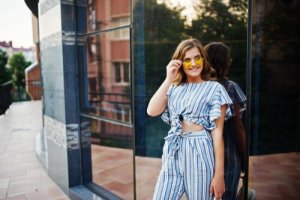Fashion Psychology: What Your Clothes Say About You

You don’t have to be a fashion enthusiast to realize there’s a relationship between the way we look and how others perceive us. Clothes are always part of the things we analyze when we first meet someone. The clothes we wear allow us to project the image of ourselves that we want others to see.
Even if it’s not our intention, the way we dress says a lot about who we are. In addition, what we want to express with our fashion sense may not always be what others interpret. In this article, we’ll be touching on fashion psychology and what it’s all about.
Various scientific studies, as well as psychological surveys, have studied the true impact of our fashion choices in the way we perceive and judge each other. These different experiments had surprising results.
Fashion isn’t just for women
Many people believe that women are more fashion-oriented than men. However, studies show that men are more conditioned by fashion than we think. Contrary to popular belief, Solomon and Schopler (1982) showed that men are often more influenced than women in terms of their fashion sense and the way others see them.
Additionally, regardless if you’re a man or a woman, the fashion choices you make can affect your image, the impression you make, and the way others treat you. Clothes can have an influence on anything from the outcome of a sports match to how an interviewer will judge your work skills.
In this sense, a study found that using the color red in sportswear increases the probability of winning. On the other hand, another piece of research sought to discover to what extent an applicant’s clothing influences the interviewer’s perception of management skills and their decision to hire women for management positions or not.
A more masculine type of clothing was significant. The interviewers perceived the applicants who dressed manly as more energetic and aggressive. The applicants also received more favorable hiring recommendations when they wore masculine clothing.
“Style is a deeply personal expression of who you are, and every time you dress, you are asserting a part of yourself.”
-Nina García-

Fashion psychology: What your clothes say about you
Technological advances have made fashion significant. In the beginning, the main objective of clothes was to keep us warm and dry and protect us from the sun or dust. It was a matter of survival.
Little by little, people started using clothes to facilitate daily tasks (like pockets in pants). As technological means advanced, clothes started losing importance in terms of survival and usefulness.
Clothes no longer only help us survive and make our tasks easier. While it’s true that clothes still are practical tools, they’ve also gained meaning in other aspects. For example, we see how certain clothing items or brands can come to represent a determined status.
In many societies, fashion sense embodies wealth and personal taste. George Taylor demonstrated this with the hemline index in 1926. Taylor noted that when a country goes into recession and adopts austere spending habits, women often show a preference for longer dresses, while in times of prosperity the trend is the opposite.
A second key influence in our fashion sense is the result of millions of years of development as a species. As with many animals, the concept of choosing a mate in evolutionary psychology suggests that our behavior is determined by our effort to find a mate and reproduce.
The ability to choose an outfit also offers possibilities. It allows us to differentiate ourselves from others and express our individuality, which makes us more attractive to the person we’d like to have as a partner. Think of a peacock showing its colorful feathers to try to attract a female mate.
On the other hand, we can also use clothing to blend into a crowd and go unnoticed. For example, dressing in a uniform or adopting a somewhat homogeneous style in a determined environment to temporarily hide our individuality.

Cultural influences in fashion psychology
Many of the pieces of research regarding fashion psychology and clothing choices are subject to the cultural values of the society where each individual lives. Cultural differences are important. In fact, not all cultures have the same perception in regards to a specific color, for example.
It’s vital to point out that the superficiality of clothing choices is rarely the only factor (in terms of clothing) that conditions the way others perceive us. So not only do our clothes matter, but also how we wear them and how we put them together.
“Caring about how you look has to start in your heart and soul. Beauty products on their own won’t help.”
-Coco Chanel-
You don’t have to be a fashion enthusiast to realize there’s a relationship between the way we look and how others perceive us. Clothes are always part of the things we analyze when we first meet someone. The clothes we wear allow us to project the image of ourselves that we want others to see.
Even if it’s not our intention, the way we dress says a lot about who we are. In addition, what we want to express with our fashion sense may not always be what others interpret. In this article, we’ll be touching on fashion psychology and what it’s all about.
Various scientific studies, as well as psychological surveys, have studied the true impact of our fashion choices in the way we perceive and judge each other. These different experiments had surprising results.
Fashion isn’t just for women
Many people believe that women are more fashion-oriented than men. However, studies show that men are more conditioned by fashion than we think. Contrary to popular belief, Solomon and Schopler (1982) showed that men are often more influenced than women in terms of their fashion sense and the way others see them.
Additionally, regardless if you’re a man or a woman, the fashion choices you make can affect your image, the impression you make, and the way others treat you. Clothes can have an influence on anything from the outcome of a sports match to how an interviewer will judge your work skills.
In this sense, a study found that using the color red in sportswear increases the probability of winning. On the other hand, another piece of research sought to discover to what extent an applicant’s clothing influences the interviewer’s perception of management skills and their decision to hire women for management positions or not.
A more masculine type of clothing was significant. The interviewers perceived the applicants who dressed manly as more energetic and aggressive. The applicants also received more favorable hiring recommendations when they wore masculine clothing.
“Style is a deeply personal expression of who you are, and every time you dress, you are asserting a part of yourself.”
-Nina García-

Fashion psychology: What your clothes say about you
Technological advances have made fashion significant. In the beginning, the main objective of clothes was to keep us warm and dry and protect us from the sun or dust. It was a matter of survival.
Little by little, people started using clothes to facilitate daily tasks (like pockets in pants). As technological means advanced, clothes started losing importance in terms of survival and usefulness.
Clothes no longer only help us survive and make our tasks easier. While it’s true that clothes still are practical tools, they’ve also gained meaning in other aspects. For example, we see how certain clothing items or brands can come to represent a determined status.
In many societies, fashion sense embodies wealth and personal taste. George Taylor demonstrated this with the hemline index in 1926. Taylor noted that when a country goes into recession and adopts austere spending habits, women often show a preference for longer dresses, while in times of prosperity the trend is the opposite.
A second key influence in our fashion sense is the result of millions of years of development as a species. As with many animals, the concept of choosing a mate in evolutionary psychology suggests that our behavior is determined by our effort to find a mate and reproduce.
The ability to choose an outfit also offers possibilities. It allows us to differentiate ourselves from others and express our individuality, which makes us more attractive to the person we’d like to have as a partner. Think of a peacock showing its colorful feathers to try to attract a female mate.
On the other hand, we can also use clothing to blend into a crowd and go unnoticed. For example, dressing in a uniform or adopting a somewhat homogeneous style in a determined environment to temporarily hide our individuality.

Cultural influences in fashion psychology
Many of the pieces of research regarding fashion psychology and clothing choices are subject to the cultural values of the society where each individual lives. Cultural differences are important. In fact, not all cultures have the same perception in regards to a specific color, for example.
It’s vital to point out that the superficiality of clothing choices is rarely the only factor (in terms of clothing) that conditions the way others perceive us. So not only do our clothes matter, but also how we wear them and how we put them together.
“Caring about how you look has to start in your heart and soul. Beauty products on their own won’t help.”
-Coco Chanel-
This text is provided for informational purposes only and does not replace consultation with a professional. If in doubt, consult your specialist.







